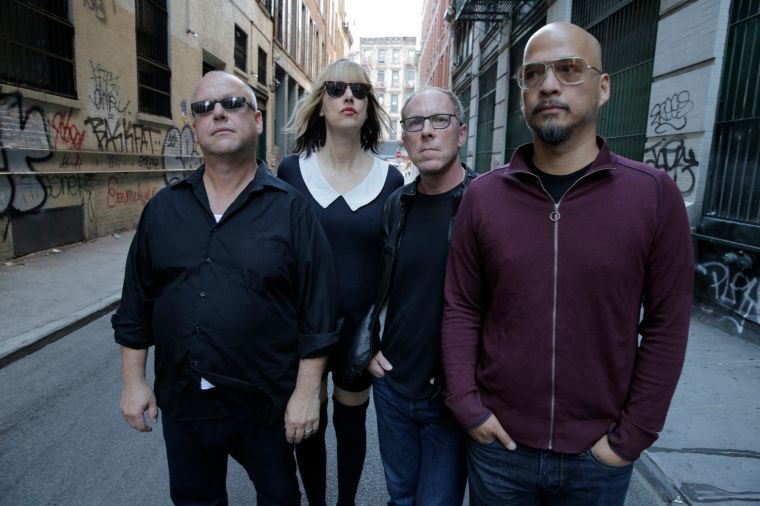Pixies play with awe-striking precision at Carnegie Music Hall
January 27, 2014
As the last forceful barks of opening act FIDLAR’s hard-driving single “Cocaine” ricocheted around the Carnegie Music Hall’s half-empty auditorium and the band took their leave to little fanfare, it was hard to shake the nagging feeling that Saturday night’s Pixies concert was going to be a depressing case of shoving the right band into the wrong venue.
This was, after all, the Pixies — the band whose greatest tracks bear titles such as “Debaser” and “Wave of Mutilation.” It was the band that followed up the release of their greatest album, Doolittle, with relentless infighting and an on-stage incident involving frontman Black Francis chucking a guitar at bass player Kim Deal.
In short, it’s not the sort of group one would expect to see headlining a venue that comes adorned with marble columns, fleur-de-lis-patterned wallpaper, velveteen seats and the eerie sense that the ghost of Andrew Carnegie was standing up in the rafters, silently judging the attire of the middle-aged ex-punks who made up the majority of the audience.
The anticipation of disappointment persisted as the band stepped on to the stage, sporting the sort of casual attire that would’ve looked fine at Mr. Small’s but was rendered pedestrian when juxtaposed with looming organ pipes and the decorative plaster ceiling. That band currently consists of three original members, Francis, guitarist Joey Santiago and drummer David Lovering, as well as new bassist Paz Lenchantin. Lenchantin replaced Kim Shattuck, who was fired in November. Shattuck had previously replaced Deal, who quit earlier in 2013.
However, as soon as Lovering counted the band in for opening song “Bone Machine,” it was clear that the show was a case of four magnificently talented musicians playing in the only venue that would do them justice.
There were no niceties exchanged at this show. Taking Francis’ lead, the band ripped through 31 of its greatest tracks with barely a moment in between, each one as perfectly timed and unbelievably clear as the last.
While the dizzying pace and near-mechanical efficiency of the performance could have felt like a joyless endeavor, it instead made the show so immersive that security was kept busy forcing audience members back into their seats as they ventured out into the aisle to thrash around to their favorite Surfer Rosa tracks.
More than anything, though, the straightforward performance made it abundantly clear just how much chemistry the band developed through the years. Newcomer Lenchantin added a gorgeous flourish to Francis’s piercing choruses, and Santiago’s guitar work was so precise and so poignant that each note carried as much meaning and emotion as any line Francis uttered. The frenzied tracks, such as “Crackity Jones,” created an atmosphere that had the audience utterly entranced.
Anchoring it all was Lovering’s pounding bass drum and often unnoticed but indispensable backing vocals. Although it was a night full of breathtaking moments, few were quite so impressive as when Lovering took the lead on “La La Love You,” captivating the entire room with every utterance of “La la love you, pretty baby.”
Though it may have kept the clamoring fans imprisoned to fancy seating, Carnegie Music Hall’s top-notch acoustics deserve much of the credit for the incredible clarity of the performance.
Santiago had his moments of fun with the guitar, firing notes into the crowd midway through the show, but this was a performance that put musicianship — not showmanship — on display. When every track sounds as clear and good as the album cut, there’s no need to pander to the audience. Any eye candy the audience needed was provided by the simple but brilliant backlighting, distorted through a series of lenses and manipulated to help capture the emotion behind each song.
In the late 19th century, when Carnegie commissioned the construction of the impressive complex that now houses Carnegie Music Hall, he probably pictured Pittsburgh’s most eminent businessmen, socialites and politicians flocking to his stately temple of culture to enjoy pleasant conversation, performances by the world’s finest concert musicians and a sense of amazement at the seemingly limitless wealth Pittsburgh’s least-hated industrialist had amassed. Yet as the last haunting “oohs” of “Where Is My Mind” faded out and the Pixies left the stage, it felt like this had been the show for which that hall was really built.



